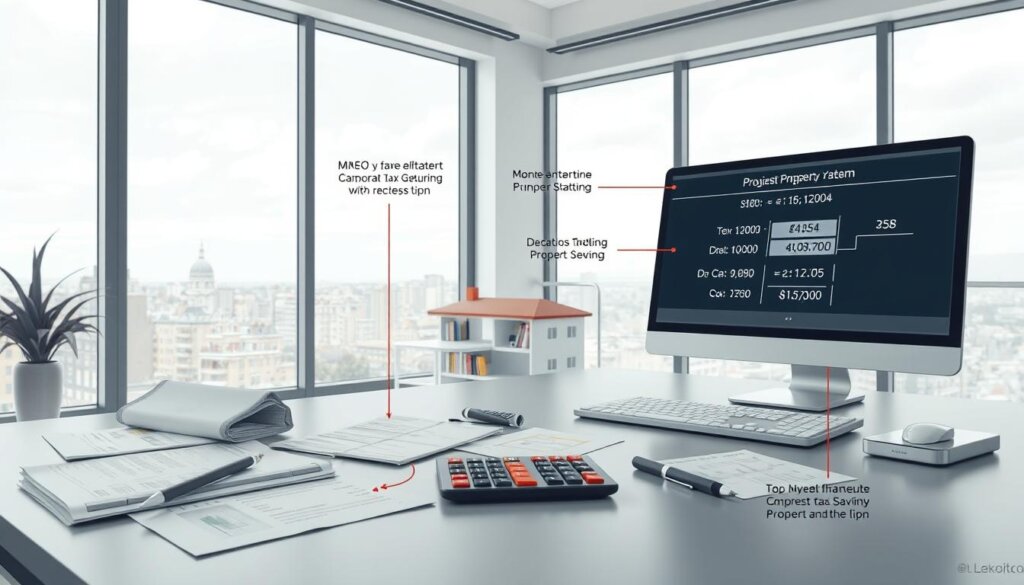Did you know Alanya’s annual council tax rates for residential properties average 83% lower than cities like Paris or Berlin? That’s not a typo – Turkey’s system prioritises affordability, making it a magnet for savvy investors. I’m Aydın Çakır, a licensed real estate agent here since 2006, and I’ve helped hundreds of international buyers navigate these opportunities. Let’s cut through the jargon together.
Table Of Content
- Key Takeaways
- Understanding the Turkish Real Estate Tax System
- How Valuation Shapes Your Bills
- Payment Flexibility & Legal Must-Knows
- Property Taxes in Alanya
- Residential vs Commercial: The Numbers
- When You Might Pay Nothing
- Navigating Taxes When Acquiring Property in Turkey
- Transfer Fees, VAT and Stamp Duty
- Impact on Title Deeds and Debt Liabilities
- Managing Ongoing Tax Liabilities and Debts
- Handling Unpaid Taxes and Arrears
- Tax Considerations for Foreign and Resident Investors
- Non-Resident Tax Implications and Double Taxation Agreements
- Optimising Tax Payment for Income Generation
- Conclusion
- FAQ
- How is real estate tax calculated for properties in Alanya?
- When are annual property tax payments due in Turkey?
- Are there exemptions for foreign buyers on value added tax (VAT)?
- What fees apply when transferring a Turkish title deed (tapu)?
- Do non-residents face higher tax rates on rental income?
- How are unpaid property taxes handled for inherited estates?
- Can agricultural land qualify for reduced tax rates?
- What happens if I dispute my property’s valuation for tax purposes?
Unlike many European countries, Turkey calculates charges based on a property’s notional value – a figure set by local councils. For example, a £150,000 flat might have an official valuation of £90,000 here. Smaller dwellings under 100m² often qualify for exemptions too. Payments can be split into two yearly instalments or settled upfront – flexibility that surprises many newcomers.
One crucial detail? Unpaid bills from previous owners transfer to new buyers. That’s why I always recommend thorough checks. With my direct line – +90 532 577 87 67 – you’re never alone in this process. Let’s explore how Alanya’s straightforward system could work for your investment goals.
Key Takeaways
- Council valuations determine charges, often below market value
- Smaller homes may qualify for full exemptions
- Payments split into two instalments or single annual sum
- New owners inherit any unpaid previous bills
- Professional verification prevents unexpected costs
Understanding the Turkish Real Estate Tax System
Turkey’s approach to real estate charges balances fairness with investor appeal. Having guided buyers since 2006, I’ve seen how clarity in this process builds trust – let’s break it down step by step.

How Valuation Shapes Your Bills
Municipalities reassess official valuations every four years, using factors like:
- Location (city size impacts rates)
- Square metreage
- Construction quality
For instance, a £200,000 home in metropolitan Istanbul might carry a 0.3% rate, while smaller towns apply 0.1%. This explains why a £150k villa could have annual charges under £200.
Payment Flexibility & Legal Must-Knows
You can pay property bills in two chunks (May/November) or annually. But here’s what catches newcomers:
- Owners must register purchases with local councils within 30 days
- Commercial spaces face higher rates (typically 0.2-0.3%)
- Late payments accrue 1.4% monthly interest
In my 17 years here, I’ve prioritised flagging these details early. A quick call to +90 532 577 87 67 lets us verify any exempt property statuses or arrears before commitments.
Property Taxes in Alanya
Alanya’s mix of beachfront apartments and bustling retail spaces means charges vary widely. Let me show you how this works in practice – I’ve handled over 200 transactions here since 2018.

Residential vs Commercial: The Numbers
Holiday flats here carry a 0.1% annual rate on their official valuation. Commercial spaces? That jumps to 0.2%. See how this plays out:
| Property Type | Market Value | Council Valuation | Annual Charge |
|---|---|---|---|
| 2-bed flat | £120,000 | £85,000 | £85 |
| Beach café | £250,000 | £180,000 | £360 |
Notice how the café pays over four times more despite similar values? That’s why location and usage matter.
When You Might Pay Nothing
Three common exemptions I’ve secured for clients:
- Homes under 100m² – full relief if single-owned
- Farmland producing crops – 50% reduction
- New builds – first-year discounts up to 75%
Last month, we saved a British couple £1,200 on their villa purchase using agricultural exemptions. Always check historical bills too – unpaid sums transfer automatically to new owners.
For deeper insights, explore our comprehensive guide covering special cases. Need personalised advice? My team verifies every detail – just ring +90 532 577 87 67.
Navigating Taxes When Acquiring Property in Turkey
Many buyers focus solely on listing prices… until they discover three mandatory charges that reshape budgets. Let me walk you through these often-overlooked costs – I’ve saved clients thousands by planning for these from day one.

Transfer Fees, VAT and Stamp Duty
Every purchase triggers three main charges:
- 3.3% transfer fee – split equally between buyer/seller
- Value added tax – 1% for homes under 150m², 18% for commercial spaces
- 4% stamp duty – calculated on purchase contracts
| Property Type | Price | Transfer Fee | VAT | Total Fees |
|---|---|---|---|---|
| 120m² flat | £200,000 | £6,600 | £2,000 | £8,600 |
| Shop unit | £350,000 | £11,550 | £63,000 | £74,550 |
Impact on Title Deeds and Debt Liabilities
Here’s where things get critical – unpaid bills stick to the title deed like glue. Last year, a client nearly inherited £8,200 in overdue charges from 2019. We caught it through:
- Municipal debt checks
- Notary public verification
- Land registry searches
Smart buyers always request three documents:
- Current owner’s payment receipts
- Council clearance certificate
- Up-to-date valuation report
Need help untangling these requirements? My team cross-checks every detail – ring +90 532 577 87 67 for peace of mind.
Managing Ongoing Tax Liabilities and Debts
Overlooking annual charges here can turn a smart investment into a financial headache faster than you’d think. Let me share a quick story: last summer, a client discovered £3,200 in unpaid bills from 2020 on a flat they’d just purchased. We resolved it, but only because we caught it early. Here’s how you can stay ahead.
Handling Unpaid Taxes and Arrears
Turkey’s Law No. 6183 applies a 1.4% monthly penalty on overdue amounts – that’s 16.8% annually. Let’s break down what this means:
- A £500 unpaid bill becomes £584 after one year
- Debts stick to the title deed, not the owner
- Resale attempts trigger immediate settlement demands
Three steps I take with every client:
- Request current payment receipts from sellers
- Verify council records through official channels
- Cross-check land registry entries for liens
Foreigners often benefit from local services offering payment reminders. One British investor I work with uses calendar alerts for the two annual deadlines (May 31st and November 30th). Missed a payment? Settle arrears within 60 days to avoid extra fees.
| Debt Age | Original Fee | Penalty (1 Year) | Total Payable |
|---|---|---|---|
| 6 months | £300 | £25.20 | £325.20 |
| 18 months | £300 | £75.60 | £375.60 |
Keep digital copies of all documents – I’ve seen paperwork get lost in council offices. Need real-time updates? My team provides monthly statements for clients. Just call +90 532 577 87 67, and we’ll handle the details while you focus on enjoying your investment.
Tax Considerations for Foreign and Resident Investors
Understanding your fiscal status here transforms how you approach investments. I’ve seen clients reduce liabilities by 40% simply by structuring ownership correctly – let’s unpack your options.

Non-Resident Tax Implications and Double Taxation Agreements
If you spend under six months yearly in Turkey, you’re taxed only on local income. Residents declare worldwide earnings. Here’s the kicker: the UK’s double taxation agreement means you’ll never pay twice on the same income. How it works:
- Rental profits taxed at 15-35% in Turkey
- Declare these earnings in Britain with tax credits applied
- 83 countries have similar treaties, including France and Germany
Optimising Tax Payment for Income Generation
Rental income follows progressive brackets, but smart structuring changes everything. A client’s £25k annual rental profit faced 30% rates – until we set up a limited company. Now they pay corporate tax at 22% plus deductible expenses. Compare approaches:
| Structure | Annual Profit | Tax Rate | Payable |
|---|---|---|---|
| Personal | £40,000 | 35% | £14,000 |
| Corporate | £40,000 | 22% | £8,800 |
Remember: commercial properties attract VAT at 18%, but residential lets under 150m² only 1%. Always factor in your global income – I help clients model scenarios to find their sweet spot. Need personalised calculations? Let’s chat on +90 532 577 87 67.
Conclusion
Navigating Turkey’s real estate system becomes straightforward once you grasp its core principles. From fair value assessments that keep bills manageable to split payment options, the framework prioritises practicality. Always verify title deed histories – unpaid arrears transfer automatically, and I’ve seen this catch out even seasoned investors.
Residents and non-residents face different tax rates, but double taxation agreements often soften the blow. Whether you’re eyeing commercial properties or holiday lets, remember: exemptions exist for those who know where to look. A flat under 100m² might cost nothing annually, while rental income can be optimised through smart structuring.
Key steps? Check council valuations, confirm payment deadlines, and consult local rules for foreign owners. My team cross-references every detail – from value added obligations to historical debts – so you’re never caught off guard.
Ready to move forward? Let’s turn insight into action. Call me at +90 532 577 87 67, and we’ll ensure your investment starts – and stays – on solid ground.
FAQ
How is real estate tax calculated for properties in Alanya?
Taxes are based on the property’s fair value determined by local councils, with rates between 0.1%–0.6% annually. Residential properties typically fall at 0.1%, while commercial or vacant land may reach 0.6%. The exact amount depends on location, size, and usage.
When are annual property tax payments due in Turkey?
Payments are split into two instalments – 31 May and 30 November each year. Missing deadlines incurs a 1.5% monthly interest penalty. I always advise setting reminders or automating payments to avoid fines.
Are there exemptions for foreign buyers on value added tax (VAT)?
Yes! New-build purchases by non-residents often qualify for 1% VAT instead of the standard 18%, provided they meet criteria like no Turkish income. Resale properties are VAT-exempt. This can save thousands if negotiated correctly during acquisition.
What fees apply when transferring a Turkish title deed (tapu)?
Buyers pay 4% of the declared value as a one-time fee. Sellers contribute another 4%, though this is often negotiated. Always verify the declared value aligns with market rates – undervaluing risks future tax audits.
Do non-residents face higher tax rates on rental income?
Foreigners pay 20% withholding tax on rental earnings, while residents pay 15-35% based on income brackets. However, double taxation treaties with 85+ countries may reduce liabilities. Properly declaring expenses like maintenance can lower taxable amounts.
How are unpaid property taxes handled for inherited estates?
Debts transfer to heirs and must be settled before selling. I’ve seen cases where 10-year arrears accumulated 180% penalties. Always request a tax clearance certificate during inheritance processes to avoid surprise liabilities.
Can agricultural land qualify for reduced tax rates?
Absolutely. Farms or undeveloped plots registered for agriculture pay just 0.1% annually versus 0.3-0.6% for other vacant land. Documentation proving active farming use must be submitted to municipal offices for approval.
What happens if I dispute my property’s valuation for tax purposes?
You can appeal within 30 days of assessment. Successful appeals often involve presenting recent comparative sales data or independent appraisals. About 40% of challenges result in reduced valuations in Alanya – but professional support is crucial.







No Comment! Be the first one.